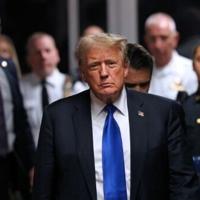A landmark decision was reached as a New York jury found Donald Trump guilty on all charges in his hush money case on Thursday, just five months before the upcoming election. This comes as Trump aims to secure the White House once again.
In this historic trial, the former US president, aged 77, was convicted on all 34 counts of falsifying business records to conceal a payment intended to silence porn star Stormy Daniels.
Following the verdict, Trump, who was released without bail and plans to appeal, expressed his disappointment calling the result a “disgrace” and “rigged.” He declared that the real judgment will come from voters in the presidential election on November 5.
This conviction brings the United States into new and uncharted political territory. Despite this, it does not prevent Trump from continuing his campaign for the White House, even if he were to be sentenced to prison by Judge Juan Merchan in a highly unlikely scenario.
Sentencing is scheduled for July 11, right before the Republican National Convention in Milwaukee, where Trump is expected to be nominated as the party’s candidate against Democratic President Joe Biden.
Biden’s campaign emphasized that the trial underscores the principle that “no one is above the law,” stressing the importance of Trump’s impact on the country’s democracy.
The jury, consisting of 12 members, deliberated for over 11 hours across two days before reaching a unanimous decision within minutes. Judge Merchan commended the jury for their diligent work amid a challenging and stressful trial.
– Election conspiracy –
Trump was found guilty of falsifying business records to reimburse his lawyer, Michael Cohen, for a $130,000 payment to Daniels just before the 2016 election, a payment aimed at preventing her claims of a sexual encounter with Trump from affecting his campaign.
The trial included detailed testimony from Daniels, revealing aspects of a 2006 sexual encounter she alleges occurred with Trump. Prosecutors successfully argued that the hush money and cover-up were part of a broader scheme to conceal Trump’s behavior from voters.
Trump’s defense maintained that attempting to influence an election is a fundamental aspect of democracy and that the former president did not engage in any wrongdoing.
– Campaigning in courthouse –
The trial diverted Trump’s attention from his campaign against Biden. Despite this, he capitalized on the media attention, delivering daily speeches outside the courthouse where he portrayed himself as a political victim.
Although he had hinted at testifying, Trump ultimately chose not to do so. Political analyst and professor Keith Gaddie of Texas Christian University commented on the uncertain political ramifications of these events, suggesting that the impact on swing votes in certain states could be pivotal in tight races.
Once a renowned real estate mogul, Trump now faces the prospect of either prison time or probation. While he could potentially face up to four years in jail for each count of falsifying business records, legal experts believe that as a first-time offender, he is unlikely to serve a prison sentence.
Any appeal process is expected to be lengthy. In the event that he wins the presidency, Trump would not have the power to pardon himself, as the case was brought by the state of New York rather than the federal government.
Additionally, Trump is facing federal and state charges related to the 2020 election results and allegations of withholding classified documents after leaving office.
bur-sms/bgs





